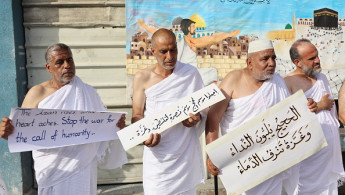Israel blocks Hajj for 2,500 Palestinian pilgrims from Gaza
Hundreds of Palestinians have been barred from leaving Gaza to take part in this year's Hajj pilgrimage to Mecca, Turkish news agency Anadolu has reported, due to Israel's control of the Rafah border crossing.
The closure of the Rafah crossing has prevented 2,500 Palestinians from travelling to Saudi Arabia to perform the pilgrimage, a key rite of Islam which all Muslims who are able to must perform at least once in a lifetime, said Ikrami Al-Mudallal, spokesperson for Gaza's Ministry of Endowments.
Pilgrims from Gaza make up roughly a third of the total Palestinian pilgrims attending Hajj this year.
The ministry's headquarters in Gaza was destroyed by Israel during the war, dramatically impacting the religious body's ability to facilitate the passage of pilgrims to Mecca.
Al-Mudallal told the Anadolu news agency that Israel's barring of Palestinians from leaving Gaza was a "clear violation of religious freedom" and the war had greatly affected their planning of the Islamic pilgrimage including logistical talks with Egypt and Saudi Arabia.
Pilgrims are selected via a lottery system initiated by the ministry in March 2023, due to restricted slots and the years-long Israeli blockade on the Gaza Strip with the elderly and the sick prioritised and departures scheduled between 20 May and 2 June.
Al-Mudallal said those pilgrims affected by the Rafah border closure would be given priority next year with many waiting for up to 10 years for their turn to attend Hajj.
Saudi King Salman bin Abdulaziz announced that his country will host 500 pilgrims from the families of those killed and wounded in Gaza, although due to the war this privilege was reserved for Gazans who had managed to leave the besieged enclave.
"This gesture allowed those who had left Gaza to perform the Hajj, preserving Gaza's right to the royal gesture," Al-Mudallal said.
On 6 June, the Saudi monarch ordered the Saudi Ministry of Islamic Affairs’ Hajj and Umrah Guest Programme to host 1,000 pilgrims from the families of Gaza's killed and wounded.
These pilgrims were selected from those who had fled Gaza due to the war or for medical treatment.
The Palestinian Ministry of Endowments said 2,000 men and women from the occupied West Bank have travelled to Jordan on 69 buses en route to Saudi Arabia with another 1,200 people flying to the kingdom.
The ministry condemned Israel for its continued aggression against Gaza, with the escalation of attacks in the southern Gaza city of Rafah and occupation of the border crossing preventing the completion of Hajj.
Al-Mudallal told Anadolu that the ministry has asked Egypt and Saudi Arabia to pressure Israel to open the Rafah border crossig and allow Gaza residents to perform Hajj.
The Israeli military on 7 May seized and closed the border crossing, which has been the main entry point for humanitarian aid going to the devastated Gaza Strip since October.
Israel’s continuous eight-month bombardment of the Gaza Strip has resulted in over 37,000 people killed, mostly women and children, according to the territory’s health ministry.
Thousands more dead are believed to be trapped under the rubble.
The war has brought the enclave to the edge of famine, and the destruction of Gaza’s healthcare system and essential infrastructure, like water networks, poses a high risk of disease outbreaks, particularly in densely populated areas like Rafah.




 Follow the Middle East's top stories in English at The New Arab on Google News
Follow the Middle East's top stories in English at The New Arab on Google News
![A group of Palestinians, foreign and Israeli activists gather to participated in an olive picking event on the land in the town of Battir, which is under threat of confiscation by Israel in Bethlehem, occupied West Bank on 8 November 2024. [Getty]](/sites/default/files/styles/image_330x185/public/2182930803.jpeg?h=199d8c1f&itok=__0LgGsa)

![People gathered around the rubble of destroyed houses to search for survivors [Getty]](/sites/default/files/styles/image_330x185/public/2024-11/GettyImages-2184733820.jpg?h=199d8c1f&itok=NiM1LO2f)